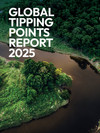October 2025: Global Tipping Points Report 2025 released ahead of COP30
The Global Tipping Points Report 2025 was published in October this year, synthesising the work of 160 authors from 23 countries and 87 institutions. This landmark assessment has issued its starkest warning yet: the planet is approaching multiple irreversible tipping points that could trigger cascading environmental breakdowns. Released just weeks before the COP30 climate summit in Belém, the 500-page report represents the most comprehensive synthesis of tipping-point science to date.
According to the report, the Earth system is entering a new reality in which key ecosystems are already starting to falter. Coral reefs are bleaching beyond recovery, the Amazon rainforest is nearing a threshold of irreversible dieback, and vast ice sheets continue to lose mass, locking in centuries of sea-level rise. Of particular concern are the world’s drylands, which cover more than 40 percent of the planet’s land surface. These regions are warming at roughly twice the global average, driving soil degradation, desertification and biodiversity loss that could push entire socio-ecological systems past recovery. Scientists warn that dryland tipping points could have far-reaching impacts on food security, migration, and global climate stability.
Yet amid the alarm, the report also highlights opportunities for “positive tipping points” - rapid, self-reinforcing shifts toward clean energy, sustainable agriculture and ecosystem restoration. The authors argue that with the right policies and investment, these could offset some of the worst impacts and trigger large-scale transformation toward a stable, resilient future.
Published deliberately ahead of COP30, the report calls on world leaders to embed tipping-point science into all aspects of climate governance, from adaptation and security planning to finance and trade. As delegates gather in Belém, its message is unmistakable: while some critical thresholds may already have been crossed, the choices made at this summit could help trigger positive tipping cascades rather than irreversible collapse.

